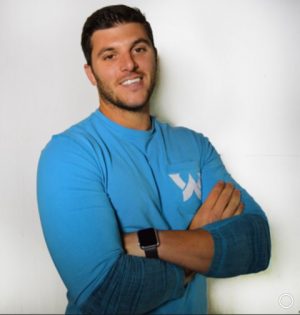Guiding Student-Athletes During Fragile Time

By Dr. Nicholas Serio, EdD
The infrastructure of an athlete’s identity is bolstered by their ability to perform, be recognized as, and continuously act as an athlete. When this is stripped from them there is a giant void that is left, creating incredible uncertainty, anxiety, and potential damage to their self-worth. Thus, it is easy to comprehend why communicating with these athletes right now is so pertinent. However severe this time may be, it is the unifying nature of an athletes’ identity that will ultimately allow us to recognize patterns in their coping strategies. These patterns will help formulate how we can aid our athletes through this immensely ambiguous time.
Last week, we put together the most diverse panel of athletes possible to recognize coping trends and leverage this knowledge to help them and others. The panel consisted of eight athletes; three females and five males. The athletes ranged from an Olympian to a high school sophomore, and the sports from track & field, lacrosse, baseball and softball. The unifying nature of their identities were on full display as each came to the video conference with a very similar deflected posture and gloomy outlook on their unpredictable future.
Having worked in the performance industry for 10+ years, I have been exposed to numerous group therapy or talk sessions, but this one was different. The anxiety, the fear, the anger, it was so universal, it was so omnipresent. Each athlete, one after the next, was exuding these emotions in grandiose fashion, as they articulated their sheer disgust for their current situation. The expressions of anger for the loss of their seasons, the fear of potentially losing their role on the team, the anxiety of not knowing how to prepare right now, with each athlete seemed to come a deeper expression of emotion. It was as if each athlete was attempting to one up the next, but yet, at the same time, they were almost comforting each other by validating the negative outlooks, in-turn unifying their emotional states.
Having had blips of previous conversations with each of these athletes I had a general idea of their outlooks and understood where many of their heads were at. As we worked our way through the group I was careful to reserve one athlete to the end, our Olympian. This athlete, unlike the others, is slightly older, more mature, and is facing a loss of identity that none of them could comprehend or one up, thus, in the emotional grading system, he was the alpha. Having the Olympics rescheduled meant a lot of uncertainty for this athlete; he is going to be one year older, one year slower, and potentially not have a contract, a sponsor, and or a career. For him, sport is his life, it is not just his passion. It is his form of income and even deeper, it is his validation of self-worth. This was something all of these athletes could perceive, yet, this reality is not something they can experience, which is why listening to him go last would prove so impactful.
He spoke not just of the fears, anger, and frustration, but also of the envy. He spoke of how envious he was of all of them for where they are at in their careers and more importantly for the opportunity they have in front of them. He discussed their need to transition their thought process from that of frustration and fear to that of potential and growth. He compelled them to heed a growth mindset and view this opportunity to perfect their craft, explore other parts of their identity, and ultimately, become more grateful for the positions they are in. It was amazing to watch how each athlete’s expressions changed from anger to almost embarrassment. From a slumped internally driven posture, to upright and attentive. When he culminated his discussion we gave the athletes a moment to collect themselves and then asked each to articulate how their viewpoint has changed, the adjustments were astonishing.
What can be learned from this experience? (a) Our student-athletes are struggling to emotionally manage this time period. Worse, they are likely perpetuating this struggle by compounding the negative outlook amongst each other. (b) We must help provide them perspective on the reality of the situation and evoke a gracious attitude towards the opportunities still in front of them. Finally, (c) we must help guide them away from a fixed and towards a growth mindset by perceiving this situation as an opportunity to better themselves and help those around them.
Dr. Nicholas Serio is a Co-Owner of Athletes Warehouse in Pleasantville. Dr. Serio has 10+ years experience in performance training, a doctorate in Performance Psychology, a masters in Kinesiology, and is an indebted husband and proud father.

Examiner Media – Keeping you informed with professionally-reported local news, features, and sports coverage.
